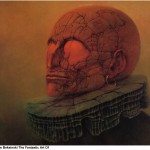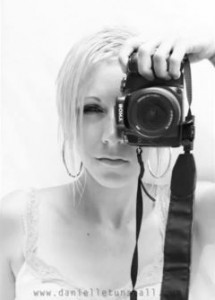Republished by Blog Post Promoter
 Brave New World is a dystopian novel written in 1931 by English author Aldous Huxley, and published in 1932. Largely set in a futuristic World State of genetically modified citizens and an intelligence-based social hierarchy, the novel anticipates huge scientific developments in reproductive technology, sleep-learning, psychological manipulation, and classical conditioning that are combined to make a utopian society. Huxley followed this book with a reassessment in an essay, Brave New World Revisited (1958), and with Island (1962), his final novel.
Brave New World is a dystopian novel written in 1931 by English author Aldous Huxley, and published in 1932. Largely set in a futuristic World State of genetically modified citizens and an intelligence-based social hierarchy, the novel anticipates huge scientific developments in reproductive technology, sleep-learning, psychological manipulation, and classical conditioning that are combined to make a utopian society. Huxley followed this book with a reassessment in an essay, Brave New World Revisited (1958), and with Island (1962), his final novel.
PLOT — The novel opens in the World State city of London in AF (After Ford) 632 (AD 2540 in the Gregorian calendar), where citizens are engineered through artificial wombs and childhood indoctrination programmes into predetermined classes (or castes) based on intelligence and labour. Lenina Crowne, a hatchery worker, is popular and sexually desirable, but Bernard Marx, a psychologist, is not. He is shorter in stature than the average member of his high caste, which gives him an inferiority complex. His work with sleep-learning allows him to understand, and disapprove of, his society’s methods of keeping its citizens peaceful, which includes their constant consumption of a soothing, happiness-producing drug called soma. Courting disaster, Bernard is vocal and arrogant about his criticisms, and his boss contemplates exiling him to Iceland because of his nonconformity. His only friend is Helmholtz Watson, a gifted writer who finds it difficult to use his talents creatively in their pain-free society.
Bernard takes a holiday with Lenina outside the World State to a Savage Reservation in New Mexico, in which the two observe natural-born people, disease, the aging process, other languages, and religious lifestyles for the first time. (The culture of the village folk resembles the contemporary Native American groups of the region, descendants of the Anasazi, including the Puebloan peoples of Acoma, Laguna and Zuni.) Bernard and Lenina witness a violent public ritual and then encounter Linda, a woman originally from the World State who is living on the reservation with her son John, now a young man. She, too, visited the reservation on a holiday many years ago, but became separated from her group and was left behind. She had meanwhile become pregnant by a fellow-holidaymaker (who is revealed to be Bernard’s boss, the Director of Hatcheries and Conditioning). She did not try to return to the World State, because of her shame at her pregnancy. Despite spending his whole life in the reservation, John has never been accepted by the villagers, and his and Linda’s lives have been hard and unpleasant. Linda has taught John to read, although from the only two books in her possession — a scientific manual and the complete works of Shakespeare. Ostracised by the villagers, John is able to articulate his feelings only in terms of Shakespearean drama, especially the tragedies of Othello, Romeo and Juliet and Hamlet. Linda now wants to return to London, and John, too, wants to see this “brave new world”. Bernard sees an opportunity to thwart plans to exile him, and gets permission to take Linda and John back. On their return to London, John meets the Director and calls him his “father”, a vulgarity which causes a roar of laughter. The humiliated Director resigns in shame before he can follow through with exiling Bernard.
Bernard, as “custodian” of the “savage” John who is now treated as a celebrity, is fawned on by the highest members of society and revels in attention he once scorned. Bernard’s popularity is fleeting, though, and he becomes envious that John only really bonds with the literary-minded Helmholtz. Considered hideous and friendless, Linda spends all her time using soma, while John refuses to attend social events organised by Bernard, appalled by what he perceives to be an empty society. Lenina and John are physically attracted to each other, but John’s view of courtship and romance, based on Shakespeare’s writings, is utterly incompatible with Lenina’s freewheeling attitude to sex. She tries to seduce him, but he attacks her, before suddenly being informed that his mother is on her deathbed. He rushes to Linda’s bedside, causing a scandal, as this is not the “correct” attitude to death. Some children who enter the ward for “death-conditioning” come across as disrespectful to John until he attacks one physically. He then tries to break up a distribution of soma to a lower-caste group, telling them that he is freeing them. Helmholtz and Bernard rush in to stop the ensuing riot, which the police quell by spraying soma vapor into the crowd.
Bernard, Helmholtz, and John are all brought before Mustapha Mond, the “Resident World Controller for Western Europe”, who tells Bernard and Helmholtz that they are to be exiled to islands for antisocial activity. Bernard pleads for a second chance, but Helmholtz welcomes the opportunity to be a true individual, and chooses the Falkland Islands as his destination, believing that their bad weather will inspire his writing. Mond tells Bernard that exile is actually a reward. The islands are full of the most interesting people in the world, individuals who did not fit into the social model of the World State. Mond outlines for John the events that led to the present society and his arguments for a caste system and social control. John rejects Mond’s arguments, and Mond sums up John’s views by claiming that John demands “the right to be unhappy”. John asks if he may go to the islands as well, but Mond refuses, saying he wishes to see what happens to John next.
Jaded with his new life, John moves to an abandoned hilltop tower, near the village of Puttenham, where he intends to adopt a solitary ascetic lifestyle in order to purify himself of civilization, practising self-flagellation. This soon draws reporters and eventually hundreds of amazed sightseers, hoping to witness his bizarre behaviour; one of them is implied to be Lenina. At the sight of the woman he both adores and loathes, John attacks her with his whip. The onlookers are wildly aroused by the display and John is caught up in the crowd’s soma-fueled frenzy. The next morning, he remembers the previous night’s events and is stricken with remorse. Onlookers and journalists who arrive that evening discover John dead, having hanged himself.


